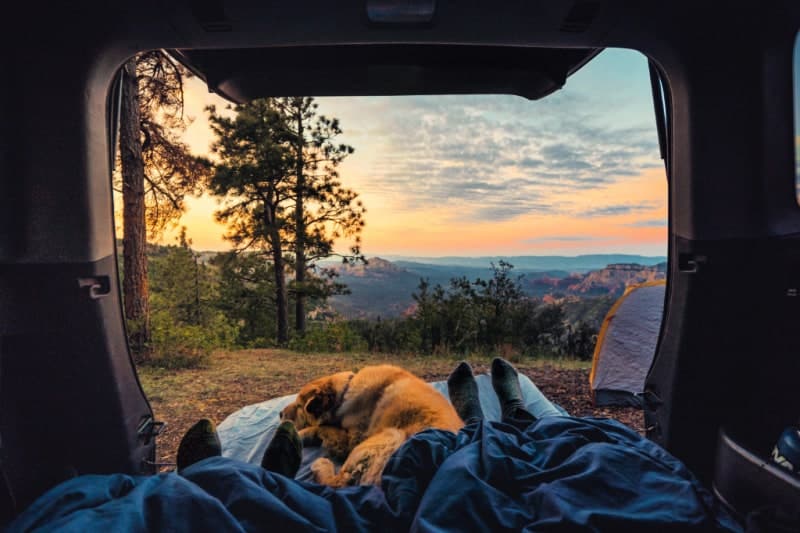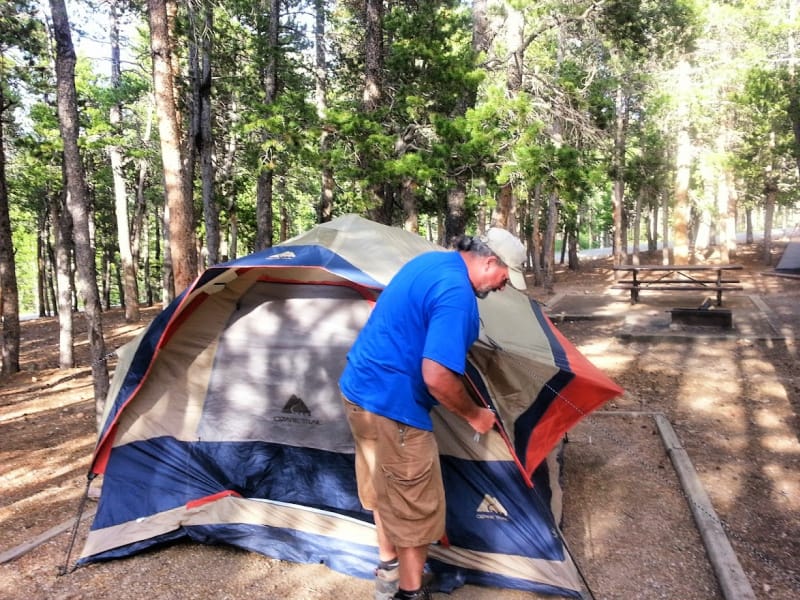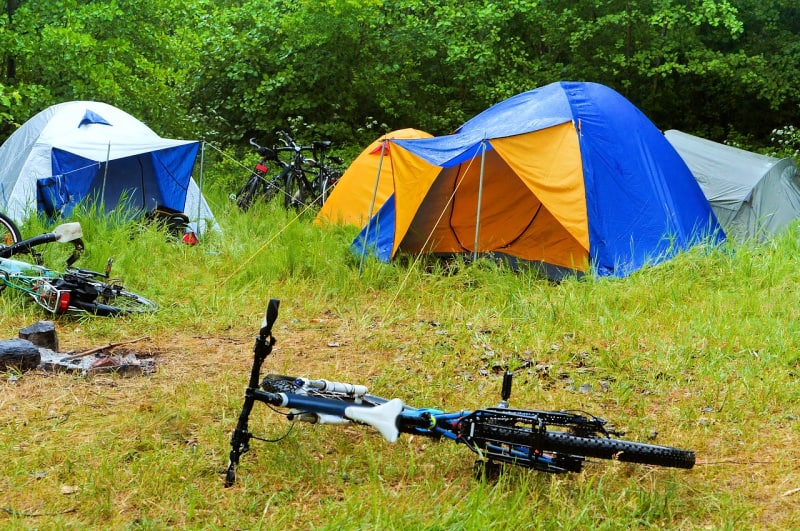With spring in the air, we all know the hot summer sun is just a few months away. It is time to start planning that family camping trip, an opportunity to get away and enjoy the great outdoors. With just a few tips you can have a worry-free relaxing vacation.

This post contains affiliate links. If you click through and buy, we may receive a commission. Thanks for helping to support TravelingInHeels.
Family Camping Tips: From Packing to Perfect Campground
Table of Contents
Whether it’s your family’s first camping adventure or seasoned campers, pre-planning for your next outdoor adventure is perhaps the most important part of the perfect camping adventure.
Start your adventure off without a hitch with these family camping tips, from packing to finding the perfect campground for your family.
Deciding On The Perfect Campground

Partaking in an adventure with your family requires some pre-planning with these camping tips.
Start by researching different parks and camping facilities. Camping sites offer a range of camping options, including campsites for tents or RVs, yurts, cabins, or simple lodging.
Do keep in mind that campsites are often booked out up to a year in advance especially at popular destinations near national parks, so do your research well in advance to ensure your final selection will be available. Lakeside resorts are particularly popular so it’s important that you look to choose one well in advance. If you can take your RV and park right alongside the lake, all the better. Just don’t forget the mozzy spray so that you’re not going to end up bitten all over!
Most websites now have all the activity information they offer included, as well as a detailed map of different available sites. Many online tools allow travelers to literally “walk” around the site long before arriving.
Once you have narrowed down the selection and decided on your location, it is time to reserve that perfect spot. It is also a good time to reserve any spots you will require for the onsite activities you and your family plan to participate in while at the park.
Many sites, such as Colorado’s YMCA of the Rockies, offer plenty of exciting year-round outdoor adventures for you and your family to enjoy. Choose from summer fun like fishing, hiking, tubing, horseback riding, or winter activities like snow tubing, snowshoeing, ice fishing, snowmobiling, and sleigh rides.
Pre-Packing for Camping Tips

Checking and re-checking all your supplies before you leave will prove valuable when it comes to getting set up on site.
Storing your camping gear in a convenient tote from the previous year ensures all of your supplies are in pristine condition.
Setting up the tent in the backyard allows fresh air to flush out any stale air from storing. It also enables you to confirm all parts are in working order and present. If you are on the hunt to purchase a new tent, a full guide on which tent will benefit your adventure can be seen here offering an in-depth look at many varieties.
Depending on your confidence at camping, you can browse many 2, 3, and all-season tents. With many tents now equipped with more modern adaptations, you will be sure to find one that will keep you comfortable while onsite.
Perform a physical examination of sleeping bags to ensure zippers and all parts are working so keeping warm and dry won’t be an issue.
To be prepared should any emergency arise, bring a fully stocked first aid kit.
Inspect your campfire cookstove and serving ware, for any damage or missing parts. Ensure you have ample cooking fuel for the entire duration of your adventure.
Stocking up on extra batteries and testing all flashlights and lanterns will keep everything bright and safe once there.
Finally, when you find the perfect camping spot but it needs clearing, pack your weed wacker to clear the area.
Loading Up The Car

With your pre-packed gear ready to go, there are a few things you will want to remember before hitting the road.
When considering what should be in your backpack, think smart and light.
It is always a good idea to dress in layers. Camping outdoors includes possibilities of temperature changes throughout the day and inclement weather.
Make sure everyone on the trip has their rain gear with plenty of dry clothes and appropriate footwear.
Depending on what activity you are planning on doing while camping, like horseback riding or rock climbing, bring the required gear to ensure you can fully participate and enjoy the activity.
The most forgotten items for family camping are:
- can opener
- insect repellent
- sunscreen
- enough water
Pack an extra water storage container
Most sites have potable water access where you can replenish any water you will need for drinking or cooking.
Investing in a quality cooler for your perishables is important. Keeping your food at the correct temperature during hot summer days will help keep your food edible and everyone eating it safe from harmful bacteria.
Setting Up On-Site Camping

Arriving at your site, inspect the ground area and decide on a spot that won’t cause grief while sleeping. Look for the softer ground without rocks or tree roots.
Place the tent on the highest ground on your site. That way, if there is a chance of rain, you will not have the rush of groundwater flowing inside your tent.
Allocate a spot for your fire and cooking areas. Ensure everyone participates in keeping the campsite clean and organized.
Animals are always a concern when outdoors. Store your food in a safe place at all times, make sure it is out of reach from any animal’s powerful sense of smell. When leaving your campsite to join in the parks’ activities, ensure all items of value are locked in your vehicle.
Keeping your family involved in outdoor activities like family camping helps develop many invaluable survival skills.
Take time to explain and educate your family on necessary skills for the outdoors. Like building a fire, or roasting marshmallows.
Enjoying nature is a great way to spend quality time with your family and with the proper preparation your camping trip can be a very enjoyable experience.
